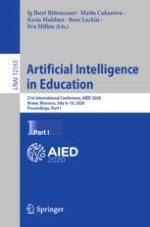2020 | OriginalPaper | Buchkapitel
Effect of Non-mandatory Use of an Intelligent Tutoring System on Students’ Learning
verfasst von : Antonija Mitrović, Jay Holland
Erschienen in: Artificial Intelligence in Education
Aktivieren Sie unsere intelligente Suche, um passende Fachinhalte oder Patente zu finden.
Wählen Sie Textabschnitte aus um mit Künstlicher Intelligenz passenden Patente zu finden. powered by
Markieren Sie Textabschnitte, um KI-gestützt weitere passende Inhalte zu finden. powered by
